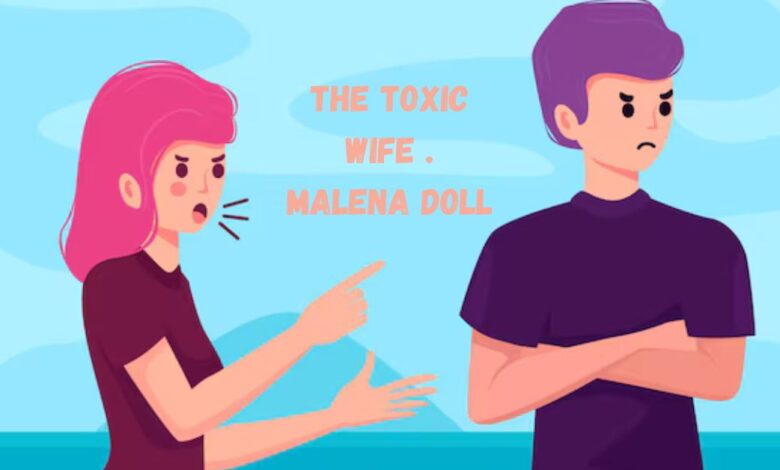The Toxic Wife . Malena Doll: Analyzing the Controversial Character

In recent years, a particular archetype has emerged within social media, popular culture, and relationship discussions—the concept of “the toxic wife.” This term has become synonymous with a partner who is manipulative, emotionally demanding, and self-centered in a way that can damage a marriage or long-term relationship. An example that has sparked considerable debate and intrigue is “Malena Doll,” a fictional character who embodies these traits and has become a symbol of what some consider a “toxic wife.”
In this article, we’ll explore the nuances of “The toxic wife . malena doll” and analyze the character’s portrayal and why such figures draw both criticism and fascination. This exploration will also touch on the broader impacts of labeling individuals as “toxic,” the effects on personal relationships, and why such stereotypes persist.
Understanding “The Toxic Wife” Stereotype
The term “toxic wife” has become a shorthand to describe partners who exhibit harmful relationship behaviors. In many cases, the actions ascribed to “the toxic wife” involve controlling, manipulative, or emotionally abusive behavior. The idea is not limited to any one gender, but this specific label is used to characterize a particular type of wife who prioritizes her desires and power in the relationship above the well-being of her spouse.
When examining the character of “the toxic wife . malena doll,” we find a portrayal of someone who epitomizes these traits. As a fictional character, Malena Doll is often used as an exaggerated representation of a toxic partner who disregards the boundaries and feelings of her spouse, focusing instead on her own needs and controlling dynamics within the relationship.
The Rise of Malena Doll: Who Is She?
“Malena Doll” has emerged in online discussions, social media posts, and storytelling as an example of “the toxic wife.” Although Malena Doll is a fictional creation, her character reflects real concerns and stereotypes associated with toxic behavior. She embodies the image of a partner who wields emotional manipulation, often resulting in an imbalanced and strained relationship.
In various depictions, Malena Doll’s character exhibits traits such as constant criticism, undermining her spouse’s confidence, using guilt as a tool, and setting unrealistic expectations. This characterization has led many to use her as a symbol of what not to do in a marriage or serious partnership, though not without controversy. While some believe the character highlights real issues in relationships, others argue that characters like Malena Doll reinforce damaging stereotypes.
Why “The Toxic Wife . Malena Doll” Resonates with Audiences
The character of “the toxic wife . Malena Doll” resonates because she embodies behaviors that many people have either experienced personally or seen in others. Relationships are complex, and in some cases, one partner might exhibit harmful tendencies, leading to the overall decline of trust, intimacy, and satisfaction in the relationship. Malena Doll’s toxic behavior is a magnification of these real-life dynamics, illustrating how small, repeated actions can erode the foundations of a marriage over time.
This type of character also sparks interest because of the fear and frustration associated with toxic relationships. People might see Malena Doll and recognize aspects of her personality in someone they know, whether it’s in their own marriage, their friends’ relationships, or even in pop culture. The portrayal of Malena Doll raises awareness about harmful behaviors that should be acknowledged, yet it also underscores the importance of avoiding generalizations and understanding the complexities of each individual’s behavior.
How “the toxic wife . malena doll” Impacts Relationship Perceptions
One of the primary concerns about characters like “the toxic wife . Malena Doll” is how they can alter perceptions of real-life relationships. By focusing on one exaggerated personality type, there is a risk of oversimplifying complex relationship issues and painting one partner as the unequivocal villain. In reality, issues within a marriage or long-term relationship are rarely caused by just one person’s toxic behavior.
While the character of Malena Doll can help illuminate signs of toxicity in relationships, it’s crucial to recognize that labels like “toxic wife” can be harmful if misused. Relationships involve two individuals, each with their own needs, faults, and motivations. Therefore, a one-dimensional character like Malena Doll may provide insight, but it is essential to approach real-life relationship challenges with empathy, understanding, and a willingness to address issues from both sides.
The Fine Line Between Critique and Stereotyping
One criticism of “the toxic wife . Malena Doll” portrayal is that it reinforces stereotypes about wives and women in relationships. By focusing on the negative traits of a toxic spouse, such characters can perpetuate unfair assumptions that women, or wives specifically, are more likely to engage in manipulative behavior.
Stereotypes can be harmful, especially if they promote a one-sided view of relationships. Instead of labeling someone as “the toxic wife,” it can be more productive to address the individual behaviors or communication patterns that may be affecting the relationship. This distinction allows for a more nuanced understanding of relationship dynamics and reduces the tendency to place blame on one partner.
Recognizing Toxic Traits Without Applying Labels
While characters like “the toxic wife . Malena Doll” can offer insight into destructive behaviors, it is helpful to focus on identifying specific toxic traits rather than labeling someone as entirely “toxic.” Some signs of toxic behavior might include:
- Emotional manipulation or gaslighting, where one partner makes the other feel uncertain about their thoughts and experiences.
- Controlling behaviors, such as restricting a partner’s social interactions or monitoring their actions.
- Criticizing or undermining a partner’s confidence.
- Frequent use of guilt or emotional blackmail.
These behaviors are indeed harmful, but they are also often a result of unresolved issues, insecurities, or learned behaviors. Instead of simply categorizing someone as “the toxic wife,” it can be beneficial to look at the reasons behind these behaviors and seek healthier solutions.
Why The Character of “The Toxic Wife . Malena Doll” Matters in Popular Culture
The character “the toxic wife . Malena Doll” serves as a cultural mirror, reflecting the issues, fears, and complexities that people encounter in relationships. Her popularity can be attributed to a desire for clarity and understanding of these often painful or confusing dynamics. By examining Malena Doll’s actions, people can recognize similar patterns in their own relationships or those around them.
However, the influence of characters like Malena Doll can go beyond awareness; they can shape the way people approach relationship issues, sometimes in unhelpful ways. Relying on fictional portrayals to understand real-life dynamics can simplify situations that require deeper analysis and communication between partners.
Moving Beyond Labels in Relationships
“The toxic wife . Malena Doll” is a powerful figure who captures attention for her striking and often harmful behaviors. But real-life relationships require a more compassionate and balanced approach. Instead of focusing on labels, it is often more helpful for partners to work together to recognize any toxic traits and commit to growth, whether through communication, therapy, or setting healthy boundaries.
Labels like “the toxic wife” can be a starting point for discussions about relationship health, but it’s essential not to allow these terms to overshadow the potential for change and healing within a relationship. Recognizing harmful behaviors is crucial, but understanding, forgiveness, and empathy are equally important elements in maintaining a healthy, supportive partnership.
Final Thoughts
The fictional portrayal of “the toxic wife . Malena Doll” is a reflection of society’s desire to understand and address complex relationship issues. While Malena Doll may be exaggerated, she serves as a reminder of the harm that toxic behaviors can inflict on a relationship. As audiences encounter characters like her, they gain insight into warning signs that may help them evaluate and improve their own relationships.
However, it is essential to approach this topic with a nuanced perspective, recognizing that labeling individuals based on archetypal behaviors does not always capture the complexity of real relationships. In the end, while “the toxic wife . Malena Doll” offers a lens through which we can understand certain toxic behaviors, real solutions lie in empathy, open communication, and a commitment to mutual respect.



